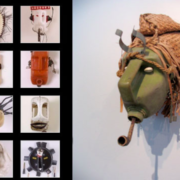Passing from Babel to Pentecost
Abstract
Meeting in Babel: it’s the meeting taking place today with people for whom the spoken language is not about sharing, but a presumed barrier to communication, where a pain is found which doesn’t have the right to be thought about nor communicated. Where a Pentecost must be launched: a meeting where, as in the famous tale of the Acts of the Apostles, everybody can understand each other beyond different languages. The present article expands on a work published in the text Lavorare con il gruppo specializzato. Teoria e clinica, edited by M. Curi Novelli. The article addresses the issue of the therapy with a group of political refugees, focusing especially on language. The experience of being “emigrants” – having left their homeland – and “immigrants” – having arrived in a new land – arouses a question: in what language can all this be narrated?And what happens when a new linguistic code enters a pre-existing associative network?
Cultural mediators are important co-actors of our profession which, in the third millenium, has to face a large part of the population which doesn’t recognize our a role and doesn’t understand the aim of our work. They are afraid of us and we are the first to be Read more

